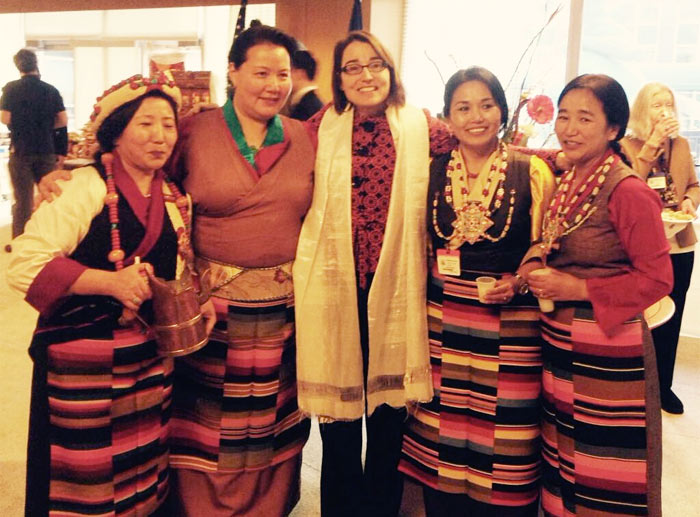Seven months later, another history was created when on February 24, 2015, Under Secretary Sarah Sewall, in her capacity as the U.S. Special Coordinator for Tibetan Issues, hosted in the State Department a Losar (New Year) to an invited group of Tibetan Americans, diplomats and other guests.

Sarah Sewall with some of the Tibetan American artists and “Chang maidens” during the State Department Losar reception.
As Under Secretary Sewall invited the gathering to join her in saying, “Losar Tashi Delek” one could sense a special emotional feeling among the Tibetan Americans privileged to be participating in the event. Excitement was clearly visible as quite a few of the Tibetan Americans who had come to help serve the traditional Tibetan delicacies and drinks could not resist taking the time to shoot photos, to record the history in the making.
In fact, Karma Gyaltsen la, who together with some other colleagues performed songs and dances, put it best when he adjusted the lyrics of a traditional Tibetan New Year fixture, the recitation by a Drekar, a jocular mendicant, wondering whether the Losar celebration within the State Department “was a dream or a reality.”
Why is the Losar at the State Department significant? As Under Secretary Sewall said at the reception, “Now, one of the amazing things about the Tibetan American community is that in numbers you all… are relatively small, but in your influence, and in your impact, you are enormous.” It heralds virtually a new year for the Tibetan Americans whose existence is increasingly being noticed in the United States.
Former Special Envoy of H.H. the Dalai Lama, Gyari Rinpoche, also saw the Losar celebration as an indication of the implementation of the United States’ objective of helping to preserve and promote the distinct Tibetan religious and cultural heritage.
As I write this, we are preparing for the next annual Tibet Lobby Day here in Washington, D.C., which will be held on March 2 and 3. This is an event that has seen increasing participation by Tibetan Americans as they go to the offices of their members of Congress and exercise the freedom to express their views on Tibet to them.
Henceforth, Losar would not only be an exotic tradition of a people far away in Tibet, but is a Tibetan American culture and thus as American a culture as any other.
